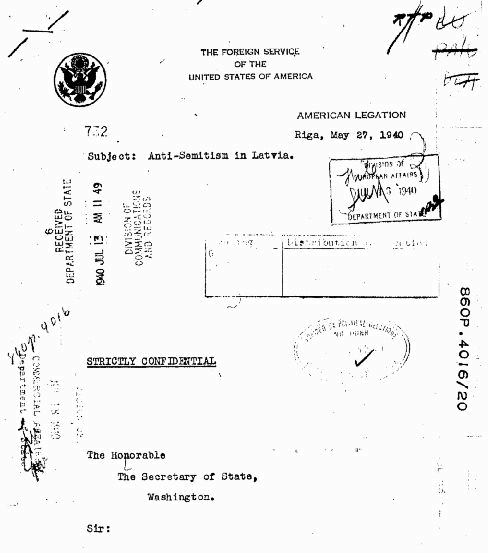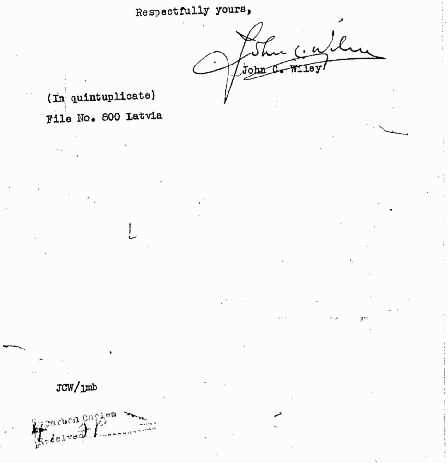
Anti-Semitism in Latvia
Documents obtained and donated by Paul Berkay and transcribed by Sherri Goldberg

I have the honor to report that anti-Semitism appears to have been adopted as the policy of the Latvian Government. No official pronouncement on the subject has been made and officially the existence of such a policy is denied. In private conversation, high officials of the Government do not, however, deny that such a policy is being pursued. In Latvia as elsewhere there has probably always been some anti-Semitism. Before 1914 there appears to have been good and mutually beneficial relations between the dominant German Baltic class and the Jewish commercial and professional community. The Latvians and the Jewish minority seem on the whole to have lived together in relative harmony. The full vigor of the present anti-Semitic drive seems to date only, curiously enough, from the recent "repatriation" of the Baltic German minority.
According to reliable information, the Government decided upon an anti-Semitic policy last September and the resignation on October 24, 1939 of Alfred Valdmanis, the Minister of Finance, was made by him as a gesture of protest.
The application of anti-Semitism in Latvia is made very easy by the administrative technique of the country. Nearly everything is permitted but only on the basis of a special permit. If a Jew wishes to establish a business, dismiss or engage employees, move his residence, transfer his business premises, or perform any of the other innumerable functions of life or business, such a permit is usually withheld without explanation. In addition, under the pretext of recruiting additional labor for the land, Jewish households are being deprived of their servants under 50 years of age. There is, moreover, discrimination against Jewish lawyers, doctors and dentists. I am informed in this connection that no Jewish lawyers have been admitted to practice since the coup d’etat on May 15, 1934.
The imposition of taxes on Jewish business is described as confiscatory and many Jewish industries are prevented from obtaining sufficient raw materials, while Latvian and state own competitors receive ample stocks.
A leading member of the Jewish community, who belongs to an industrial family which has been established in Latvia for 200 years, is the only one who, in private conversation, has struck an optimistic note. He does not believe that anti-Semitism in Latvia will ever achieve the proportions which it has reached in Germany. As for the measures applied to the lives and property of the Jewish community, he insisted there was a saving grace in Latvia, namely, corruption; that by greasing the proper palms there was almost nothing that could not be arranged. This refuge from oppression may indeed exist but I doubt very much whether it is readily available to the Jewish community as a whole.
The leading anti-Semites are said to be President Ulmanis, the Minister For Foreign Affairs, M. Vilhelms Munters, and M. Alfreds Berzins, the Minister of Public Relations. The President, however, has close personal relations with M. Morduch Dubins, President of the Riga Hebrew Council and a former member of the defunct Latvian parliament. Through his intervention a certain alleviation has been obtained in respect of a few special cases. His influence, however, is not described as effective in respect of the President’s attitude towards the situation in general.
In a subsequent dispatch I shall endeavor to assemble statistical data with regard to the extent to which Jewish property interests have been affected by Latvia’s "cold pogrom", as well as to give the Department an estimate of the extent to which the Jewish community has participated in the commercial, industrial and professional life of Latvia.

| |
Back to Courland Site Index Primary Courland Links: Courland Infofiles | Historical Essays, Memoirs and Reports | Courland Genealogical Data | Gubernskie Vedomosti On-Line | Courland Research Group - Present and Future |